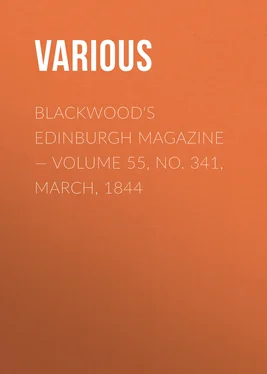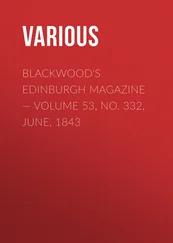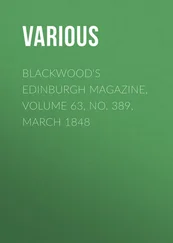Various - Blackwoods Edinburgh Magazine – Volume 55, No. 341, March, 1844
Здесь есть возможность читать онлайн «Various - Blackwoods Edinburgh Magazine – Volume 55, No. 341, March, 1844» — ознакомительный отрывок электронной книги совершенно бесплатно, а после прочтения отрывка купить полную версию. В некоторых случаях можно слушать аудио, скачать через торрент в формате fb2 и присутствует краткое содержание. Жанр: foreign_antique, periodic, foreign_edu, на английском языке. Описание произведения, (предисловие) а так же отзывы посетителей доступны на портале библиотеки ЛибКат.
- Название:Blackwoods Edinburgh Magazine – Volume 55, No. 341, March, 1844
- Автор:
- Жанр:
- Год:неизвестен
- ISBN:нет данных
- Рейтинг книги:5 / 5. Голосов: 1
-
Избранное:Добавить в избранное
- Отзывы:
-
Ваша оценка:
- 100
- 1
- 2
- 3
- 4
- 5
Blackwoods Edinburgh Magazine – Volume 55, No. 341, March, 1844: краткое содержание, описание и аннотация
Предлагаем к чтению аннотацию, описание, краткое содержание или предисловие (зависит от того, что написал сам автор книги «Blackwoods Edinburgh Magazine – Volume 55, No. 341, March, 1844»). Если вы не нашли необходимую информацию о книге — напишите в комментариях, мы постараемся отыскать её.
Blackwoods Edinburgh Magazine – Volume 55, No. 341, March, 1844 — читать онлайн ознакомительный отрывок
Ниже представлен текст книги, разбитый по страницам. Система сохранения места последней прочитанной страницы, позволяет с удобством читать онлайн бесплатно книгу «Blackwoods Edinburgh Magazine – Volume 55, No. 341, March, 1844», без необходимости каждый раз заново искать на чём Вы остановились. Поставьте закладку, и сможете в любой момент перейти на страницу, на которой закончили чтение.
Интервал:
Закладка:
At length they reached the city of Furri, loaded, for the thirty-fifth time, with the baggage of the British embassy. The caravan, escorted by a detachment of three hundred matchlock men, with flutes playing, and muskets echoing, and the heads of the warriors decorated with white plumes, on the 16th July entered the frontier town of the kingdom of Efat. Clusters of conical-roofed houses, covering the sides of twin hills, here presented the first permanent habitations that had greeted the eye since leaving the sea-coast—rude and ungainly, but right welcome signs of transition from depopulated waste to the abodes of man. The African seems a robber by nature, and the sight of the bales and boxes excited the national propensity in a most violent degree. Even the royal ministers and courtiers seem to have felt a passion for looking into those prohibited treasures, which evidently tempted their virtue in a most perilous degree. Meanwhile a special messenger arrived, bearing reiterated compliments from the Negoos, (king,) with a horse and a mule from the royal stud, attired in the peculiar trappings which belong to majesty. Those animals awoke all the loyal curiosity of the people. At the sight women and girls, enveloped in blood-red shifts, who had thronged to stare at the strangers, burst into a scream of acclamation. A group of hooded widows thrust their fingers into their ears and joined in the clamour. The escort and camel-drivers placed no bounds to their hilarity. A fat ox, that had been promised, was turned loose among the spectators, pursued by fifty savages with their gleaming creeses , and hamstrung by a dexterous blow, which threw it bellowing to the earth in the height of its mad career, and tribes of lean curs commenced an indiscriminate engagement over the garbage.
The neighbouring nations look upon the population of this province with great contempt. They say that their tongues are long for lying, their arms are long for stealing, and their legs are long for running away.
The mission now approached another region, perhaps the finest in Africa. Every change in the climate and soil in Africa is in extremes, and barreness and unbounded fertility lie side by side.
"As if by the touch of the magician's wand, the scene now passes, in an instant, from parched wastes to the geen, and lovely islands of Abyssinia, presenting one scene of rich and thriving cultivation. The baggage having at length been consigned to the shoulders of six hundred grumbling Moslem porters—for here the camel, from the steepness of the hills, was useless—and forming a line, which extended upwards of a mile, the embassy, on the morning of the 17th, comnenced the ascent of the Abyssinian Alps; the flutes again played, the wild warriors of the escort again chanted their songs. It was a cool and lovely morning, and an invigorating breeze played over the mountains' side, on which, now less than ten degrees from the equator, flourished the vegetation of northern climes. The rough and stony road wound on, by a steep ascent, over hill and dale, now skirting some precipitous ascent, now dipping into the basin of some verdant hollow, where it suddenly emerged into a succession of shady lanes, bounded by flowering hedgerows."
All this is so like England, and so unlike Africa, that we should suspect the major's memory to have been as active at least as his observation. But the work contains so much internal evidence of accuracy, independently of the confidence attached to the character of the intelligent writer himself, that we must believe the heart of Ethiopa to possess secnes that would be worthy of the heart of our own fresh and flower-bearing island. The scene which follows is quite Arcadian.
"The wild rose, the fern, the lantana, and the honeysuckle, smiled round a succession of highly cultivated terraces, and on every eminence, stood a cluster of conically thatched houses, environed by green hedges, and partially embowered amid dark trees As the troop passed on, the peasant abandoned his occupation to gaze at the novel procession; while merry groups of hooded women, decked in scarlet and crimson left their avocations in the hut to welcome the king's guests with a shrill ziroleet , which ran from every hand. Birds warbled among the groves. At various turns of the road the prospect was rugged, wild, and beautiful. The first Christian village was soon revealed on the summit of a height. Three principal ranges of hills were next crossed in succession. Lastly, the view opened upon the wooded site of Ankober occupying a central position in a horseshoe crescent of mountains, still high above which enclose a magnificent amphitheatre of ten miles in diameter. This is clothed throughout with a splendid vigorous, and varied vegetation."
The embassy now halted, waiting for permission to enter the capital, and taking up their quarters in a town three thousand feet above Furri, on the frontier. The escort of the troop fired a salute on entering, and, as they marched along, performed the war dance. A veteran capered before the ranks with a drawn sword between his teeth, and the martial song was chorused by three hundred Christian throats. The prospect from this elevated point naturally struck the travellers with astonishment and admiration. The site of the town is only one of the thousand cones into which the mountain side is broken as it approaches the plain. The prospect over the plain was boundless, and countless villages met the eye upon the mountain slope. Wherever the plough could go, all was cultivated. Wheat, barley, Indian corn, beans, peas, cotton, and oil plant, throve luxuriantly round every hamlet. The regularly marked fields mounted in terraces to the height of three or four thousand feet, becoming, in their boundaries, more and more indistinct, until totally lost in the shadowy green side of Mamrat (the Mother of Grace.)
This mountain is a wonder, shrouded in clouds whilst all was sunshine below. It is clothed with a dense forest, and ascends to an elevation of 13,000 feet above the sea. Here are collected, for security, the treasures of the monarch which have been amassing since the re-establishment of the kingdom, one hundred and fifty years since.
After remaining some time in the market-place, the governor of the town appeared, and conducted the mission to the house of an old Moslem woman, where they were to lodge for the night. The names of the three daughters, Major Harris observes, were worthy of the days of Prince Cherry and Fair Star. They were Eve, Sweet Limes, and Sunbeam. The ladies vacated the house with great good-humour; but it was low, intolerably filthy, and without bedding or food. The unfortunate mission had thus to spend a night, probably unequaled by their sufferings in the open field. Though so near the equator, they felt the cold severely; rain set in with great violence, pouring through the roof, and entering into the threshold. A fire was indispensable, yet they were nearly suffocated with smoke; they were devoured with insects, and in this torment and fever tossed till dawn. At the arrival of morning they received the disappointing message, that the king could not yet visit his capital, but that they might either seek him among the mountains, or wait for him where they were.
Major Harris imputes this disappointment to the accidental opening of one of the boxes of presents. Royal cupidity had been so strongly excited by the conjectures of their contents, that the king had evidently been anxious, in the first instance, to hasten their delivery as much as possible. Gold and jewels were probably uppermost in the royal conceptions; but the box happening to contain only the leathern buckets belonging to the "galloper guns," the spectators were loud in their derision. "These," they exclaimed, "are but a poor people! What is their nation compared with the Amhara? for behold, in this trash, specimens of the offerings brought from their boasted land to the footstool of the mightiest of monarchs."
Читать дальшеИнтервал:
Закладка:
Похожие книги на «Blackwoods Edinburgh Magazine – Volume 55, No. 341, March, 1844»
Представляем Вашему вниманию похожие книги на «Blackwoods Edinburgh Magazine – Volume 55, No. 341, March, 1844» списком для выбора. Мы отобрали схожую по названию и смыслу литературу в надежде предоставить читателям больше вариантов отыскать новые, интересные, ещё непрочитанные произведения.
Обсуждение, отзывы о книге «Blackwoods Edinburgh Magazine – Volume 55, No. 341, March, 1844» и просто собственные мнения читателей. Оставьте ваши комментарии, напишите, что Вы думаете о произведении, его смысле или главных героях. Укажите что конкретно понравилось, а что нет, и почему Вы так считаете.












